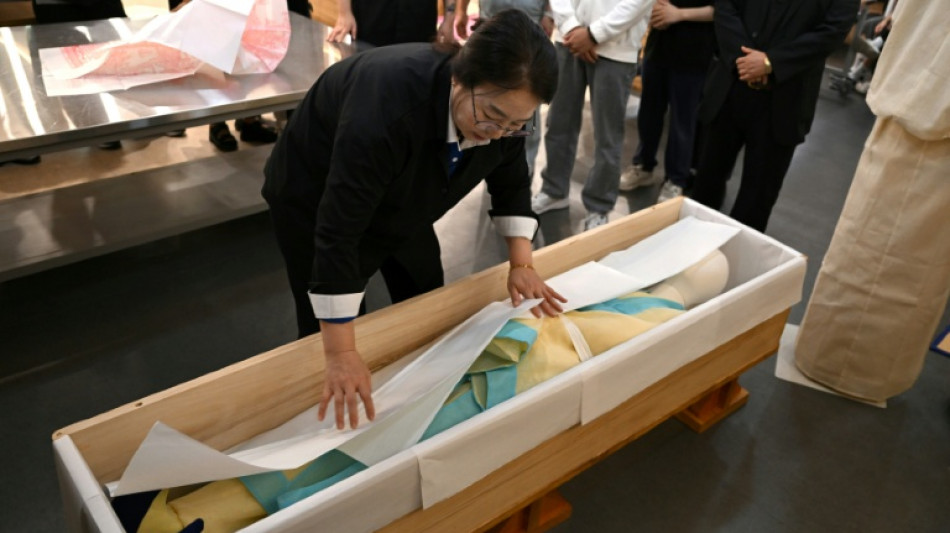
-
 US Navy veterans battle PTSD with psychedelics
US Navy veterans battle PTSD with psychedelics
-
'Unheard of': Dodgers in awe of iron man Yamamoto

-
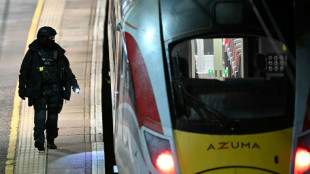 UK police probe mass train stabbing that wounded 10
UK police probe mass train stabbing that wounded 10
-
'It's hard' - Jays manager Schneider rues missed chances in World Series defeat

-
 Women's cricket set for new champion as India, South Africa clash
Women's cricket set for new champion as India, South Africa clash
-
Messi scores but Miami lose as Nashville level MLS Cup playoff series

-
 Dodgers clinch back-to-back World Series as Blue Jays downed in thriller
Dodgers clinch back-to-back World Series as Blue Jays downed in thriller
-
Vietnam flood death toll rises to 35: disaster agency
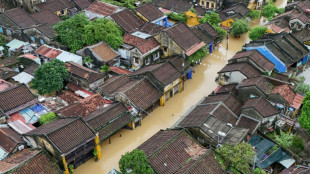
-
 History-making Japan golf twins push each other to greater heights
History-making Japan golf twins push each other to greater heights
-
Death becomes a growing business in ageing, lonely South Korea
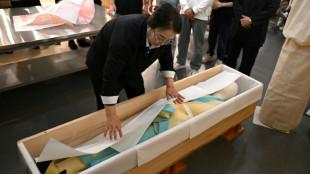
-
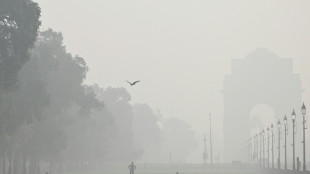 India's cloud seeding trials 'costly spectacle'
India's cloud seeding trials 'costly spectacle'
-
Chiba wins women's title, Malinin leads at Skate Canada

-
 Siakam sparks injury-hit Pacers to season's first NBA win
Siakam sparks injury-hit Pacers to season's first NBA win
-
Denmark's fabled restaurant noma sells products to amateur cooks
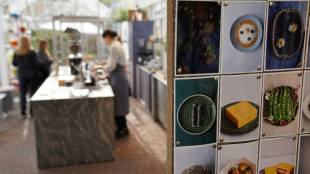
-
 UK train stabbing wounds 10, two suspects arrested
UK train stabbing wounds 10, two suspects arrested
-
Nashville top Messi's Miami 2-1 to level MLS Cup playoff series

-
 Fergie, her daughters and the corgis hit by Andrew crisis
Fergie, her daughters and the corgis hit by Andrew crisis
-
'I can't eat': Millions risk losing food aid during US shutdown
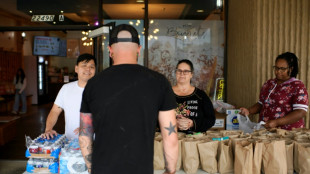
-
 High price of gold inspires new rush in California
High price of gold inspires new rush in California
-
'Swing for the fences': Carney promises bold budget as US threat grows

-
 UK police arrest two after 'multiple people' stabbed on train
UK police arrest two after 'multiple people' stabbed on train
-
NBA Hawks lose guard Young for four weeks with knee sprain

-
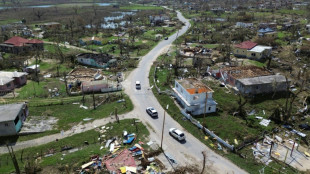 50 dead as Caribbean digs out from Hurricane Melissa
50 dead as Caribbean digs out from Hurricane Melissa
-
Forever Young gives Japan first Breeders' Cup Classic triumph

-
 Mbappe's Real Madrid extend Liga lead, Villarreal move second
Mbappe's Real Madrid extend Liga lead, Villarreal move second
-
Salah savours 'great feeling' after 250th Liverpool goal

-
 Ethical Diamond surges to upset win in $5 million Breeders' Cup Turf
Ethical Diamond surges to upset win in $5 million Breeders' Cup Turf
-
Kinghorn kicks Toulouse to Top 14 summit

-
 Mbappe extends Real Madrid's Liga lead in Valencia rout
Mbappe extends Real Madrid's Liga lead in Valencia rout
-
All Blacks sink 14-man Ireland 26-13 in Chicago Test

-
 World champ Malinin takes lead at Skate Canada
World champ Malinin takes lead at Skate Canada
-
Liverpool snap losing streak as Salah hits 250 goals in Villa win

-
 Salah's 250th Liverpool goal sinks Villa as Arsenal cruise at Burnley
Salah's 250th Liverpool goal sinks Villa as Arsenal cruise at Burnley
-
Morant suspended by Grizzlies after rebuking coaching staff

-
 Spalletti begins Juve tenure with win at Cremonese but Napoli held
Spalletti begins Juve tenure with win at Cremonese but Napoli held
-
Frank refuses to condemn Van de Ven, Spence for snub in Spurs defeat

-
 France superstar Dupont extends Toulouse deal
France superstar Dupont extends Toulouse deal
-
Egypt officially opens grand museum near pyramids

-
 French fraud watchdog reports Shein for 'childlike' sex dolls
French fraud watchdog reports Shein for 'childlike' sex dolls
-
Scotland thrash USA before All Blacks' clash

-
 Five things to know about the Grand Egyptian Museum
Five things to know about the Grand Egyptian Museum
-
Bayern rest stars but ease past Leverkusen before PSG clash

-
 Dead quiet: Paris Catacombs close for renovations
Dead quiet: Paris Catacombs close for renovations
-
Families separated, children killed as survivors flee Sudan's 'apocalyptic' El-Fasher
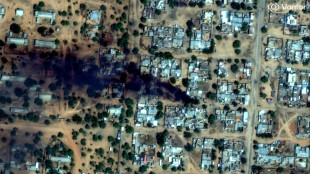
-
 Napoli held by Como as Spalletti begins Juve adventure
Napoli held by Como as Spalletti begins Juve adventure
-
Southampton boss Still vows to fight on as pressure mounts

-
 Borthwick hails 'ball of energy' Pollock as England down Australia
Borthwick hails 'ball of energy' Pollock as England down Australia
-
Egypt opens grand museum in lavish, pharaonic ceremony

-
 Joao Pedro strikes at last as Chelsea edge past Spurs
Joao Pedro strikes at last as Chelsea edge past Spurs
-
Ohtani to open for Dodgers in World Series deciding game seven


Death becomes a growing business in ageing, lonely South Korea
Rows of coffins line a university classroom in the South Korean port city of Busan, ready for use in training the funeral directors of the future in a rapidly ageing country.
Growing numbers are finding work in the business of death as South Korea undergoes massive demographic change, with birth rates among the lowest in the world and almost half the population aged 50 or older.
Students at the Busan Institute of Science and Technology carefully draped a mannequin in traditional Korean funeral cloth, smoothing the fabric as if over real skin, before gently lowering it into a coffin.
"With our society ageing, I thought the demand for this kind of work would only grow," said Jang Jin-yeong, 27, a funeral administration student.
Another student, 23-year-old Im Sae-jin, decided to enter the field after his grandmother died.
"At her funeral, I saw how beautifully the directors had prepared her for the final farewell," he said.
"I felt deeply grateful."
- 'Like portraits' -
More and more South Koreans are also living -- and dying -- alone.
Single-person households now account for around 42 percent of all homes in Asia's fourth-largest economy.
A new profession has emerged reflecting that statistic: cleaners who are called in to tidy up homes after their occupants, most of whom lived alone, have died.
Former classical musician Cho Eun-seok has cleaned many homes where people were found dead, sometimes months after their passing.
Their homes are "like their portraits", Cho, 47, told AFP.
He described heartbreaking traces: hundreds of neatly capped soju bottles and dusty boxes of gifts that were never opened.
South Korea has the highest suicide rate among developed nations, and these "lonely deaths" include those who died alone by their own hand.
Cho recently began receiving calls from used-car leasing companies to clean vehicles later found to be where clients ended their lives.
He is also developing a device to detect signs of unattended deaths that he said can harm the environment, causing pest infestations and forcing the disposal of belongings from entire households.
In summer, the smell spreads fast: "within three days it seeps into everything -- the fridge, the TV -- and nothing can be saved."
The home of a woman who had died recently in her late eighties was still filled with traces of her life when AFP visited -- an old air conditioner, bottles of cosmetics and a portable toilet, while several walking sticks stood by the door.
- 'Everything must be cleared away' -
The work sometimes requires more than just cleaning.
Kim Seok-jung once cleared the home of a late lyricist and found a set of songs she had not shared with her relatives. He turned them into a song for the bereaved family.
And Cho remembered a high school girl who lived alone in a gosiwon -- a cramped room typically less than five square metres -- after she escaped domestic violence.
He visited once a month to clean. The teenager, suffering from depression, had been unable to tidy up herself.
Piles of belongings and rotting food covered the bed and the air was thick with flies.
But she carefully looked after a small box, insisting Cho never throw it away.
She took her own life in that small room a year later.
When Cho returned to clean, he found that a hamster had been living in the box all along.
Beside it sat her guitar -- she had dreamed of becoming a musician.
"The moment I saw the hamster, all I could think was that I had to save it and keep it alive," Cho said.
Kim Doo-nyeon, a veteran in the funeral business, said he has a growing number of recruits in their twenties.
"When people live together, they share things... even if one person dies, those items remain," he said.
"But when someone dies alone, everything must be cleared away."
Back at class in Busan, Im admitted to some trepidation about his chosen career path.
"I am scared," he said.
"No matter how much you prepare, facing a deceased person is frightening."
A.Ammann--VB
